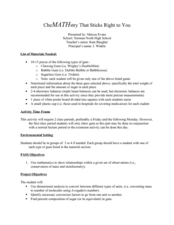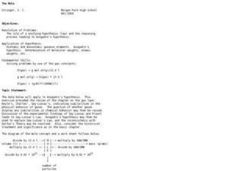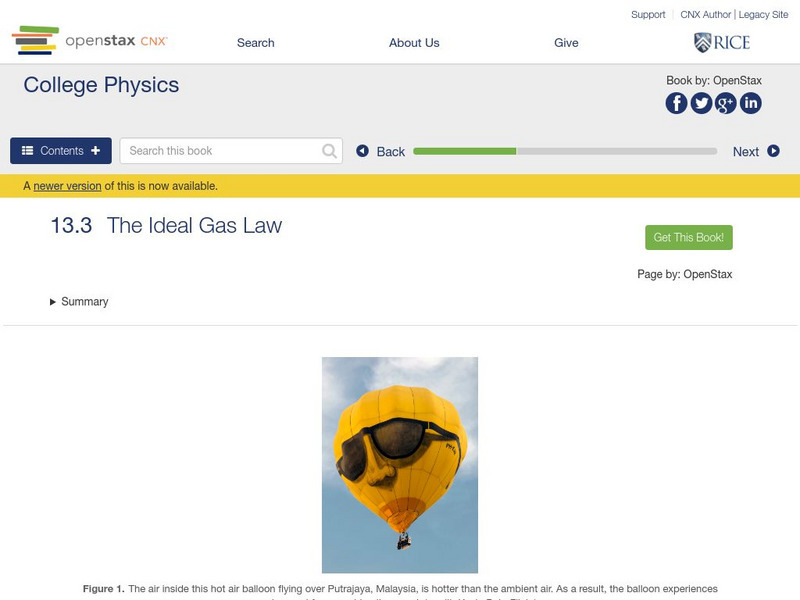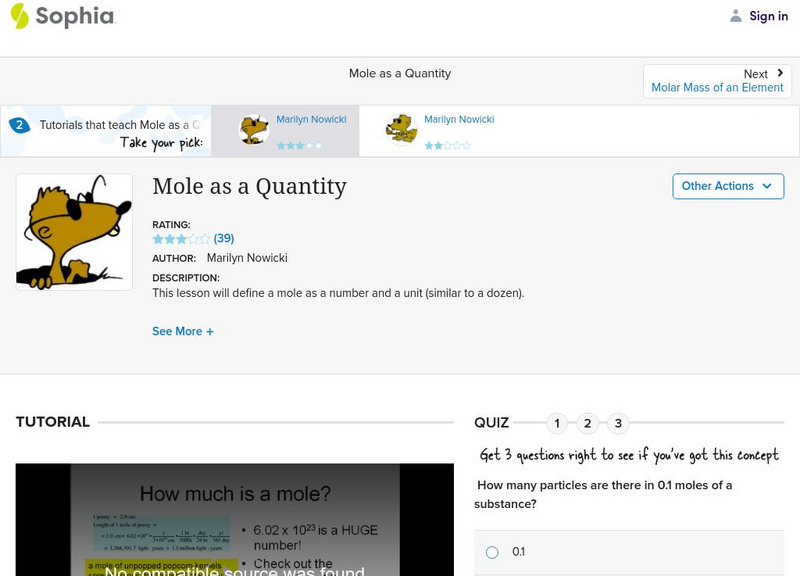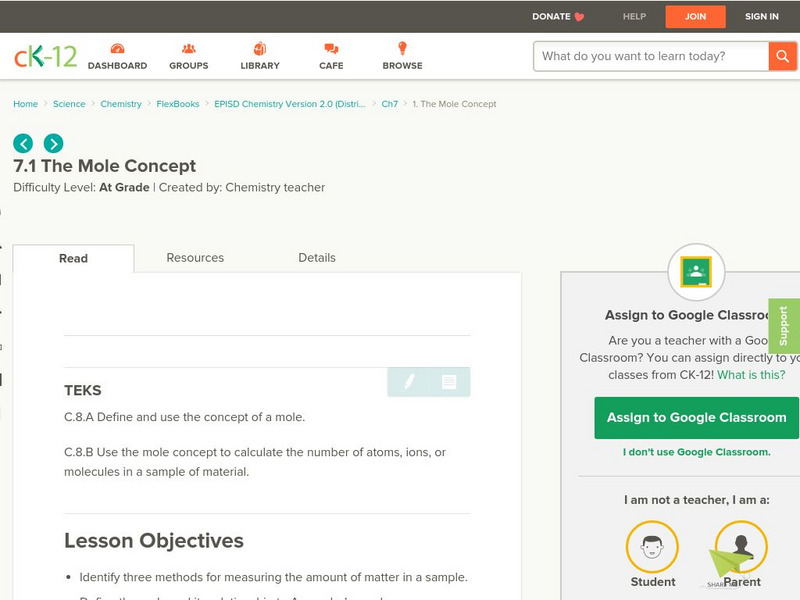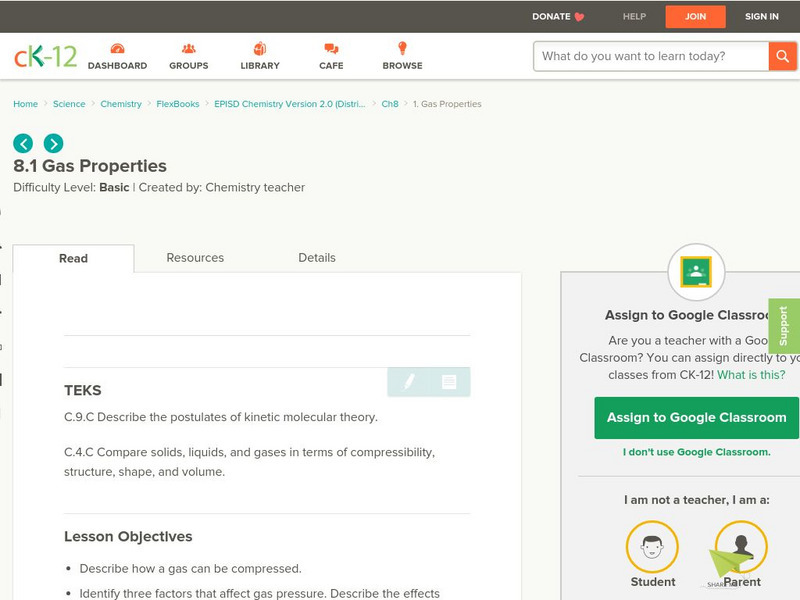Curated OER
Gas Law Summary
In this chemistry worksheet, high schoolers memorize a pneumonic phrase in order to remember the Gas Law and then apply this to other content as well.
Curated OER
CheMATHstry That Sticks Right to You
Students find the percent composition of sugar in the gum. In this chemistry lesson, students calculate percent error from the experiment. They use dimensional analysis to convert between units.
Curated OER
The Mole
Students explore the concent of using the mole to solve problems related to counts small particles of matter. Students work individually and in groups to complete conversions of substances from moles to matter.
Curated OER
Ammonium Nitrate - Efficient Fertilizers
Students study the chemistry of ammonium nitrate and consider the advantages and disadvantages of this compound. They compare different fertilizers and calculate the molar mass and percent nitrogen in the different fertilizers.
Curated OER
Stoichiometry
In this stoichiometry worksheet, students identify types of reactions, show the products, and balance the equations. Students determine the limiting reagent, theoretical yield, and percent yield for given reactions. This worksheet has 5...
Curated OER
From Molecules to Mole Day Do's
Students recognize methods used to define the mole. After converting various quantities to the mole, students provide a context for understanding the usefulness of scientific notation and the mole.
Khan Academy
Khan Academy: The Mole and Avogadro's Number
An explanation the mole (named for molecule) and Avogadro's Number. One mole of a substance is equal to 6.022 times 10 to 23rd power units of that substance (such as atoms, molecules, or ions). The number 6.022 time 10 to 23rd power is...
Other
Chris Johnson: Amedeo Avogadro
This site deals with Amedeo Avogadro, his life, his contributions to chemistry, and his famous number.
Chiral Publishing
Chiral Publishing: An Introduction to Chemistry: Relating Mass to Number of Particles: Audio Book
This slide and audio book shows how to relate mass to a number of particles by using many formulas, examples, and real life scenarios. View the weighted average calculations, Avogadro's number, the atomic mass of carbon, and molar mass.
TED Talks
Ted: Ted Ed: How Big Is a Mole? (Not the Animal, the Other One.)
Video describes how moles are used in chemistry and how their size is measured. [4:33] Followed by a short quiz and a list of additional resources to explore.
OpenStax
Open Stax: College Physics: The Ideal Gas Law
A section in a college textbook exploring the ideal gas law in relation to molecules and in terms of moles. Learn how to calculate the variables in the ideal gas law. Also become familiar with Avogadro's number and how to use it to...
Simon Fraser University
Chem1 Virtual Textbook: Moles and Their Uses
As part of the "Basic Atomics" section of the Virtual Textbook, this site examines moles. The information presented defines moles in relation to Avogadro's number and then goes on to describe molar mass and molar volume.
Iowa State University
Iowa State University: Argument for Scientific Realism
This page from Iowa State University describes the various experimental ways that Avogadro's number has been determined.
Other
Lock Haven: Glossary of Frequently Misused or Misunderstood Physics Terms
A page, written by Donald E. Simanek of Lock Haven University discusses misused and misunderstood physics terms and concepts. It reminds us that Avogadro's number is a constant, and should be treated as such.
Sophia Learning
Sophia: Mole as a Quantity
Learn how to define a mole as a number, and estimate the size of a mole of some common objects. [3:18]
CK-12 Foundation
Ck 12: The Mole Concept
[Free Registration/Login may be required to access all resource tools.] In the following online tutorial students will identify three methods for measuring the amount of matter in a sample. They will define the mole and its relationship...
Texas Education Agency
Texas Gateway: The Ideal Gas Law
By the end of this section, you will be able to state the ideal gas law in terms of molecules and in terms of moles; use the ideal gas law to calculate pressure change, temperature change, volume change, or the number of molecules or...
Vision Learning
Visionlearning: Atomic Theory and Structure: The Mole: Its History and Use
An introduction to the mole, a unit of measurement that quantifies atoms and molecules.
Chiral Publishing
Chiral Publishing: An Introduction to Chemistry: Avogadro's Law: Volume Number of Particles
Animation depicting Avogadro's Law or how the volume of a gas is affected by the number of gas particles. See what happens to the volume of a gas when the pressure and temperature stay constant.
CK-12 Foundation
Ck 12: Chemistry Simulation: Mole Carnival
[Free Registration/Login Required] In the mole carnival, students count the number of atoms and particles in different objects found at the carnival. As students work to find the number of particles, they practice counting particles by...
CK-12 Foundation
Ck 12: The Mole Concept
[Free Registration/Login may be required to access all resource tools.] In this learning module, students investigate the mole concept, and learn three ways scientists to quantify things as tiny as atoms.
CK-12 Foundation
Ck 12: Gas Properties
[Free Registration/Login may be required to access all resource tools.] The following online tutorial describes how a gas can be compressed and identifies three factors that affect gas pressure. Students will describe the effects...
Chemistry Collective
Chem Collective: Stoichiometry Tutorials: Dimensional Analysis
Watch a short tutorial showing the conversion between the amount of a substance expressed in number of molecules to the amount of a substance expressed in moles of molecules, and then try some dimensional analysis practice problems.
Cosmo Learning
Cosmo Learning: Junior Chemistry With Chemguy
A collection of video lectures to teach junior high students topics in chemistry. Lectures cover topics in understanding the periodic table, compounds, chemical bonding, Avogadro's number, balancing chemical equations, stoichiometry,...



